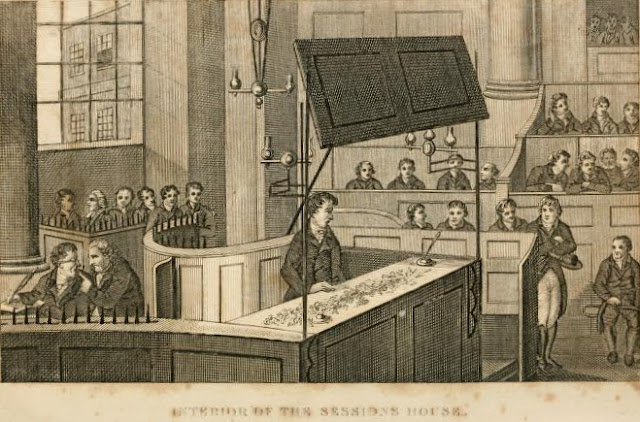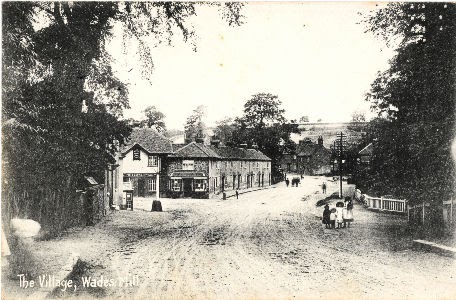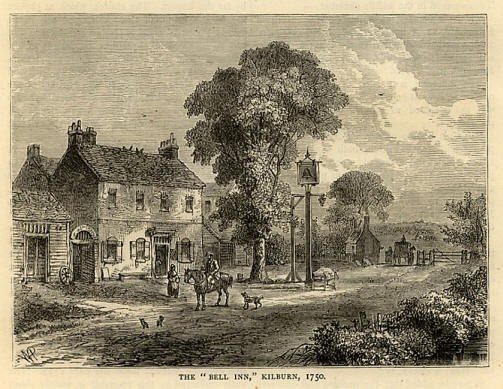 |
| The Interior of the Sessions House (The Newgate Calendar, Vol. III., n.d. 18??) |
HENRY PERFECT
(Alias the Rev. Mr. Paul, Rev. Mr. Bennet, &C.)
A most plausible Swindler transported to Botany Bay, in April 1805.
As published in The Newgate Calendar, Volume III (n.d. 18??)
No one was a greater proficient in this most specious kind of villainy than the subject of the following narrative. He had long carried on his depredations on the public without detection, under assumed names and characters, and whose plans for duping the credulous were, perhaps, the most artful that ingenious wickedness could contrive. He was the son of a clergyman in Leicestershire, and formerly a lieutenant in the 69th regiment of foot. He was twice married, and had considerable property with each wife. Having been at length found out in his impositions, he was indicted on the statute of Geo. II. for obtaining money under false pretences from the Earl of Clarendon. His trial, which occupied the whole of the day, and excited universal attention, came on at the Middlesex sessions, Hick's-hall, October 27, 1804. Mr. Gurney, in a very able and eloquent address, expatiated on the enormous guilt of the prisoner, who had personated the various and imaginary characters of the Rev. Mr. Paul, the Rev. Daniel Bennet, Mrs. Grant, Mrs. Smith, &c. and who also had the art of varying his hand-writing on every occasion, having kept notes in what hand every original letter had been written, with what kind of wafer or wax it was sealed, &c. He likewise kept his book of accounts as regular as any merchant in London.
 |
| Wade's Mill Village, Hertfordshire (n.d. 18??) |
The Earl of Clarendon having been at his seat near Wade's Mill, Hertfordshire, in the month of July, 1804, received a letter, which was read in evidence: it was signed H. Grant, and stated in substance as follows : —
That the writer having heard from a lady, whose name she was not at liberty to reveal, the most charming character of his Lordship for kindness and benevolence, she was induced to lay before him a statement of her distressed circumstances. The supposed lady then detailed her case, which was, that she was a native of Jamaica, of affluent and respectable family; that a young man, a Scotchman, and surgeon's mate to a man of war, was introduced at her father's house, who so far ingratiated himself with her father, that he seriously recommended him to her for her husband. She did not like him, because he was proud, and for ever vaunting of his high family; but as her father's will had always been a law, she consented, on condition that he would live at Jamaica. They were accordingly married, and her father gave him 1000 l. He, however, soon became discontented with remaining at Jamaica, and continually importuned her to go with him to Scotland; and, as her friends joined in the solicitation, she consented. They had now been six months in England; but her husband always evaded going to Scotland, and left her whenever she spoke upon the subject. In short, he gamed, drank, and committed every excess; and within the last six weeks he died of a rapid decline, leaving her a widow with two children, and hourly expecting to be delivered of a third. A lady had given her such a character of his Lordship, that she was induced to implore his assistance. She was not twenty-three years of age, and never knew want till now; but she was left without a shilling to support herself and miserable children: she owed for her husband's funeral, and the apothecary's bill, for which she was afraid of being arrested. To avoid this, she was going to seek shelter with a poor widow in Essex; and if his Lordship would write to her at the Post-office, at Harlow, if she were brought to bed in the mean while, she would get some safe person to go for his Lordship's letter.
His Lordships answer to this letter evinced the most benevolent heart. He expressed his readiness to alleviate her distress, but justly observed it ought to be authenticated by something more than the recital of a perfect stranger. He desired to know who the lady was who had recommended the application to him, and assured the writer she need not conceal her, for he considered it was doing him a great kindness, to afford the means of rendering service to the distressed. On the 14th of July his Lordship received a note nearly as follows:
Mrs. Smith, widow of captain Smith, begged leave to inform Lord Clarendon, that Mrs. Grant was brought to bed. It was she who recommended Mrs. Grant to Lord Clarendon: while her husband was living, she had frequently been with him on the recruiting service in Hertfordshire, where she had heard of the benevolent character of his Lordship, and recommended Mrs. Grant to state her case to his Lordship. She added, that Captain Smith, when in Jamaica, had frequently visited Mrs. Grant's father, who was a person of great wealth; that she had herself done more than she could afford, for an amiable and unfortunate young woman. She had no doubt, but that as soon as she could receive an answer from Jamaica, but that Mrs. Grant's father would send her abundant relief; but till then she might, without the friendship of some one, be totally lost.
In consequence of this last note, his Lordship returned an answer, and enclosed a draft for five guineas, offering at the same time to write to any person at Harlow, who might be of assistance to her, particularly to any medical person. On July the 23d, the supposed Mrs. Grant wrote again to his Lordship, acknowledged the receipt of the five guineas, and stated that she had the offer of a passage home: she wished to see his Lordship, to return her grateful thanks, &c. at the same time she was extremely delicate lest their meeting should be misconstrued by a malignant world, and entreated it might take place a little distance from town. The answer to this letter she begged might be addressed to A. B. C. at George's coffee-house, to which place she would send for it.
His Lordship, at her request, wrote an answer, and appointed the Bell-inn, at Kilburn. Before, however, the arrival of the day of meeting, his Lordship received another letter from Mrs. Grant, stating, that ever since she came to town she had met nothing but trouble. Her last child had died, and she was seized with a milk-fever; that she had twelve shillings left of his Lordship's, and Mrs. Smith's bounty, when she came to town; that she was afraid of coming further than Whitechapel, lest her creditors might arrest her, where she was at present miserably lodged in only one room: she concluded with a request of the loan of five pounds, to be inclosed in a note addressed to Mr. Paul, to be left at the Saracen's Head Inn, Aldgate.
 |
| The "Bell Inn," Kilburn, 1750 |
His Lordship in reply to this note, sent the money requested, and with great humanity condoled on her supposed situation. He then purposed to take her into the country, where she might live quiet, and free of expence, until she heard from her friends. The next letter introduced another actor on the stage. It came from the Rev. H. Paul. Mr. Paul, at the desire of Mrs. Grant, (then said to be delirious) acknowledged the receipt of the five pounds. He would write again, and say any thing Mrs. Grant might dictate in a lucid interval. He begged his answer might be left at the Chapter coffee-house. His Lordship accordingly wrote to the Rev. H. Paul, with particular enquiries after the state of Mrs. Grant, and proposed to send her proper medical assistance. The Rev. Mr. Paul replied to his letter, and stated the nature of Mrs. Grant's complaint, which was of a delicate nature. He then stated the high notions of Mrs. Grant, who would not condescend to see any person from his Lordship, in her present wretched state. She thought her situation such, that it was not delicate to admit any one to see her, but those absolutely necessary. Mr. Paul, therefore, promised (he said) not to divulge her residence; but, in her lucid intervals, she expressed the utmost anxiety to be enabled to thank her benefactor.
This correspondence produced a meeting between the supposed Rev. H. Paul and his Lordship, which took place at the Bell-inn, at Kilburn, on the 8th of August. The prisoner then introduced himself to his Lordship as the Rev. Henry Paul. They entered into conversation on the subject of Mrs. Grant, when his Lordship asked every question as to her situation, with a view to alleviate it. Mr. Paul said he had not seen her distinctly, for the curtains were closed round her, but the opium had had an effect which he had known it frequently to produce; it had given her eyes a more than usual brilliancy: with respect to her lodging, it was a very small room. The woman who attended her seemed a good sort of a woman enough, and she was also attended by a surgeon or apothecary. As Mr. Paul seemed to be a man of respectability, his Lordship asked him at what seminary he had been brought up: the prisoner replied, he had been educated at Westminster and Oxford, and had the living of St. Kitt's in Jamaica, worth about 700 l. per annum; that he had property in Ireland, and was going to America on private business.
To his Lordship's question how he was so fortunate to meet this young woman, he said it was by accident, that quite looked like a romance. He was coming to town in the Ongar stage, in which was a young woman, two children, and a lady, all in mourning. He entered into conversation with her, and was surprised to find her the daughter of a person at whose house, in Jamaica, he had himself been frequently received with kindness. Although his business pressed, he determined to stay and afford her some assistance. He then stated that he had that day given her a 2 l. note, which his Lordship, at this interview, returned (being the note on which the indictment was founded). He added, that Mrs. Grant's father was extremely affluent, and he should not wonder if he was to remit 500 l. at the first intelligence of his daughter's situation. His Lordship added, that he expressed himself in the language of the purest truth and benevolence; and as he appeared a well educated gentleman who had seen the world, his Lordship had no suspicion of any fraud.
After this interview, a correspondence ensued between Mr. Paul and his Lordship; the former informing his Lordship daily of the state of Mrs. Grant's health, accompanied with requests for linen, poultry, fruit, and wine, all of which were supplied by the bounty of his Lordship.
At length Mrs. Grant was sufficiently recovered to write to his Lordship; in which letter she remarked, that but for the kind assistance of the Rev. Mr. Paul, she should have been lost. And although she was ordered by her medical attendant to keep herself perfectly quiet, yet she sat up in bed to write to his Lordship, and anticipated the pleasure of her meeting her benefactor. The last letter from Mr. Paul was dated August 13. He acknowledged the receipt of 6 l. 2 s. which had been expended for Mrs. Grant; and informed his Lordship, that the sheets which had been sent had, by some accident, been near brimstone, which affected Mrs. Grant very much; that her situation required fine old linen, if his Lordship had any such. He apologized, if there be any inaccuracy in his letter, because he had a head-ache and some degree of fever.
The farce now began to draw to its conclusion. His Lordship received another letter from Mrs. Grant, dated Saturday, August 11, in which the supposed lady said: —
"Last Saturday, her father's sister came to town, and found her out. She was a sour old lady, a man-hater, and snarled at the whole sex. She had taken Mrs. G. into the country with her, although she was removed at the peril of her life. The lady she was with was nearly as bad as her aunt; but as the latter was going out for a few days, her Argus would let her come to town, which would enable her to meet his Lordship. As her ill-tempered aunt had given her neither money nor clothes, she begged 4 l. of his Lordship. If this opportunity was lost, she should never be able to see him, as her aunt was a vigilant guarded woman, and hated the men so much, that at the first entrance into her room, finding the Rev. Mr. Paul there, she most grossly affronted him. She could not have any letter addressed in her own name, lest it should fall into the hands of her aunt, and therefore begged his Lordship to direct to Mrs. Harriet, Post-office, Waltham."
His Lordship, in answer to this letter, expressed some suspicions that he had been duped; in answer to which Mrs. Grant thanked Lord Clarendon for his favours, was sorry to think he should conceive himself duped, but he would find his mistake when she got home to the West Indies. In a postscript she added — "That best of men, Mr. Paul, died suddenly on Saturday last."
This closed the intercourse between his Lordship and his correspondents, Mrs. Grant and Mr. Paul. Soon afterwards he received another letter from a Rev. Mr. Bennet, setting forth a deplorable tale of misery; but his suspicions being awakened, he employed his steward to trace the supposed Rev. Mr. Bennet; when it turned out to be the prisoner at the bar, who had imposed himself on his Lordship, as the Rev. Mr. Paul, that "best of men," whom Mrs. Grant stated to have died suddenly. His lodgings being searched, a book was found in his own hand-writing, giving an account of money received (by which it appeared, that he had plundered the public to the amount of 488 l. within the last two years), with a list of the donor's names, among whom were the Duchess of Beaufort, Lord Willoughby de Broke, Lord Lyttleton, Lady Howard, Lady Mary Duncan, Bishops of London, Salisbury, and Durham, Earls of Kingston and Radnor, Lord C. Spencer, Hon. Mrs. Fox, &c. &c.
The jury found the prisoner guilty, and the court immediately sentenced him to seven years' transportation. He was sent to Botany Bay in April, 1805.
 |
| Sydney Cove, Botany Bay 1813 (J. Thornhill) |
Sources:
- Henry Perfect; The Newgate calendar improved; being interesting memoirs of notorious characters who have been convicted of offences against the laws of England, during the seventeenth century; and continued to the present time, chronologically arranged; by George Theodore Wilkinson; n.d. 18??; Courtesy: Archive.org
- Wade's Mill Village; Courtesy: Hertfordshire Genealogy
- The "Bell Inn," Kilburn, 1750; Coutesy: UK Pub History
- Sydney Cove, Botany Bay 1813 (J. Thornhill); Courtesy: Mitchell Library, State Library of New South Wales






No comments